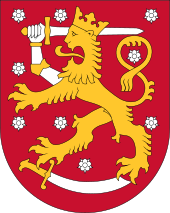This article needs additional citations for verification. (June 2020) |
| Nationality Act Kansalaisuuslaki Medborgarskapslag | |
|---|---|
 | |
| Parliament of Finland | |
| Citation | 16.5.2003/359 |
| Passed by | Parliament of Finland |
| Passed | 24 January 2003[1] |
| Signed by | President of Finland |
| Signed | 16 May 2003[2] |
| Commenced | 1 June 2003 |
| Status: Amended | |
Finnish nationality law details the conditions by which an individual is a national of Finland. The primary law governing these requirements is the Nationality Act, which came into force on 1 June 2003. Finland is a member state of the European Union (EU) and all Finnish nationals are EU citizens. They are entitled to free movement rights in EU and European Free Trade Association (EFTA) countries and may vote in elections to the European Parliament.
Any person born to a married Finnish parent is typically a Finnish national at birth, regardless of the place of birth. Children of unmarried couples in which only the father is Finnish must be legitimised for them to acquire Finnish nationality. Foreign nationals may naturalise after meeting a minimum residence requirement (usually five years) and demonstrating proficiency in Finnish, Swedish, Finnish Sign Language, or Finland-Swedish Sign Language.
- ^ "Ministry of the Interior informs: Finland to have new Nationality Act" (Press release). Embassy of Finland, London. 10 March 2003.
- ^ "New nationatily act comes into force on 1 June 2003" (Press release). Permanent Mission of Finland, Geneva. 16 May 2003.